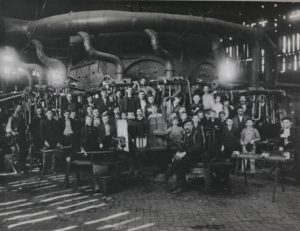
The Illinois Glass Company
Under the lead of Edward Levis and William Eliot Smith in 1873, the Illinois Glass Company of Alton, IL, became a fixture to the Alton economy and employed over three thousand workers within thirty years. This Glass Company, however, also developed into the largest employer of children within the state of Illinois. Florence Kelley would eventually campaign against this very company when titled Chief Factory Inspector by Governor John Peter Altged in 1893.
Kelley reported on the very conditions the young boys employed by the company endured: exhausting speed, heat, dust with lack of ventilation, night shifts, burns to limbs, and illiteracy. Kelley’s reports on the factory detailed the constant speed at which the young boys ran around the factory in sweltering heat, working till as late as 3am. Many of the boys’ hands were wrapped in bandages from burns caused by melting glass. The lack of regulation of these boys and ability of the Glass Company to circumvent the law was exacerbated by the Illinois Supreme Court ruling in 1895. The case, Ritchie vs. People, involved the Illinois Manufacturing Association and constitutionality of the 1893 Factory Inspection Law; this law was established by Kelley which outlawed employment of children under 14 and limited working hours for women. The court ruled the the eight-hour work day for women as unconstitutional because it extended state power too far. This set precedent to the limits of state intervention and authority within corporations and businesses.
When Governor Altged lost his bid for another term, Florence Kelley lost her job. Her replacement was a man who held a special connection with the Illinois Glass Company, having been employed by the firm for nearly thirty-years. The partnerships established between town politics and industrial companies was not an uncommon reality and one of the main reasons why child labor was so difficult to uproot, particularly through law.